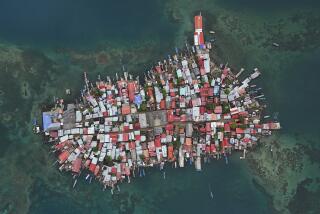2nd-Class Citizens in Australia : Islanders Unsure About Independence
- Share via
THURSDAY ISLAND, Australia — For much of their 109 years under Australian rule, the people of the Torres Straits Islands have been second-class citizens.
At one time they were forbidden to drink alcohol, barred from marrying outside their race and needed official permission to visit the Australian mainland.
Now an independence movement has sprung up, but many of the islands’ 6,000 native Melanesians are not so sure that severing links with Canberra is such a good idea.
“I know which side my bread is buttered on,” said Lully Filewood, peering from her shop along Thursday Island’s wide tree-lined main street.
Fear of Dependence
Filewood’s fears are widely echoed--that freedom might turn the islands into yet another South Pacific state dependent on overseas aid.
“Independence is only viable if the islanders sell their soul to some other nations,” said Pat Holt, an aide to John Gayler, a local member of the federal Parliament.
Many businessmen in the islands, scattered across the Torres Straits separating Australia from Papua New Guinea and Indonesia, also think that independence is pie in the sky.
“I don’t think it is realistic,” said local Chamber of Commerce Treasurer Ron Lai Foo, whose parents arrived here from China 50 years ago in the islands’ heyday as a pearl-diving center.
Pearl Industry Collapsed
Until about 50 years ago, Chinese, Japanese and South Sea island divers harvested pearls off the islands and reefs of the straits.
The century-old industry collapsed with the introduction of cultured and synthetic pearls, but not before hundreds of divers had died from the bends or shark attacks.
Lai Foo said that any incentive to independence had been killed by Australia pumping in millions of dollars annually in welfare payments.
Federal authorities and the Queensland state government spend about $14 million a year on the islands’ inhabitants, who include 4,000 whites, primarily on welfare and unemployment benefits.
‘Free as Anyone’
“The islanders are as free as anyone else in Australia,” Lai Foo said.
But native islanders, who with mainland Aborigines are Australia’s only indigenous people, say they have long been neglected by federal and state governments despite the welfare funds. They are angered at what they say is uncontrolled exploitation of their marine, mineral and land resources.
They have been unable to secure royalties for an island gold mine scheduled to start production later this year and have made no headway in preventing prawn trawlers from the mainland taking $8.25 million annually from the local economy.
Island leaders dismiss skepticism that independence is not viable, pointing to the gold mine on Horn Island, which owners Augold NL of Brisbane estimate will produce 45,000 ounces a year.
High Court Action
The islanders have mounted an Australian High Court action, to be heard later this year, against annexation of the islands by Queensland in 1879 and have lodged a claim for $3.6 billion in compensation.
Queensland first conferred citizenship rights on the indigenous Melanesians only to take them away in 1904 under controversial laws designed to protect Australia’s native people.
For decades Queensland government permission was needed for an islander to visit the mainland. During this time they could not consume alcohol, intermarriage was a crime, schools were segregated and movement of money was controlled.
Full rights were gradually restored from the late 1960s. But it was not until 1984 that Queensland legislation gave full freedom of movement and leasehold rights over much of the islanders’ traditional lands.
More to Read
Sign up for Essential California
The most important California stories and recommendations in your inbox every morning.
You may occasionally receive promotional content from the Los Angeles Times.












